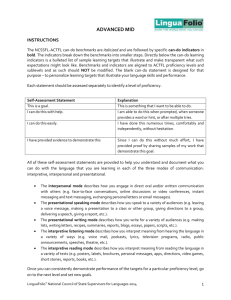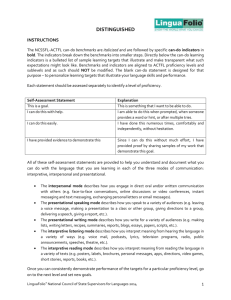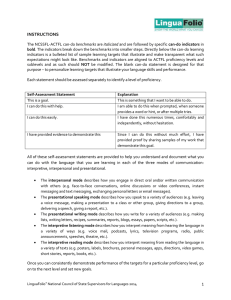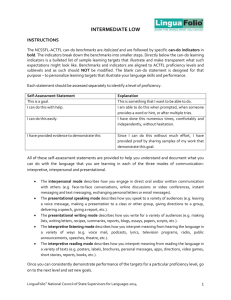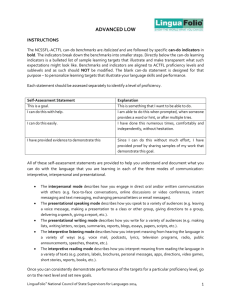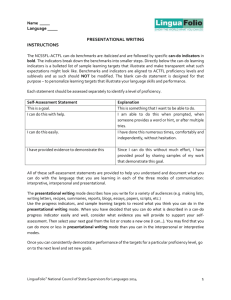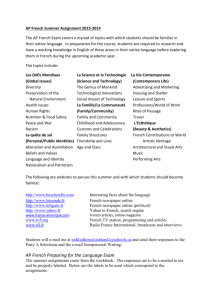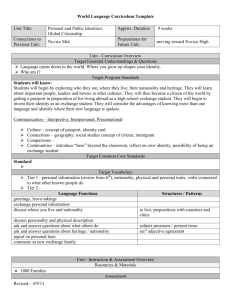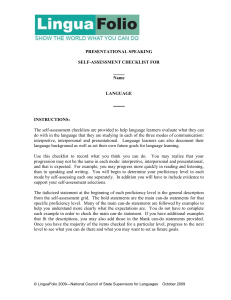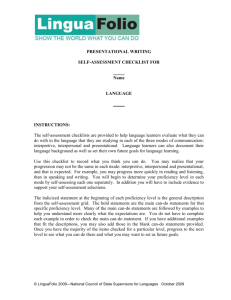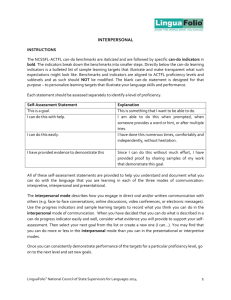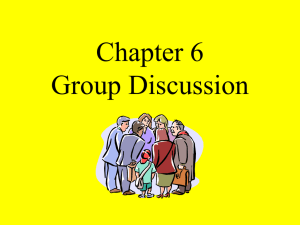Superior Self-Assessment Statements
advertisement
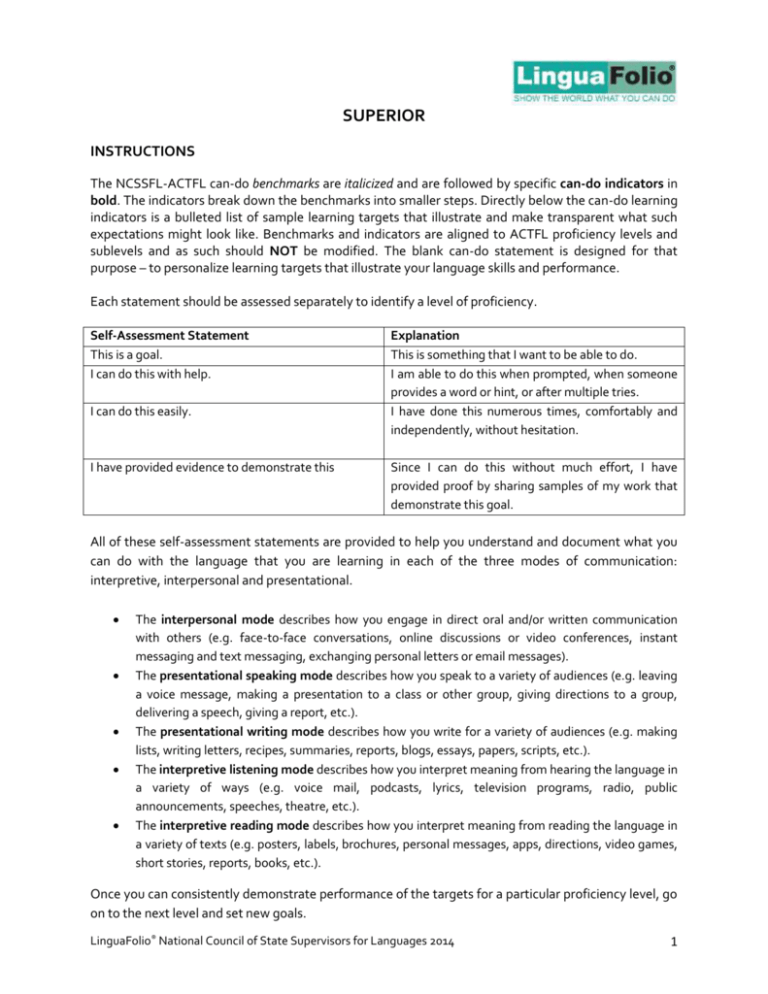
® SUPERIOR INSTRUCTIONS The NCSSFL-ACTFL can-do benchmarks are italicized and are followed by specific can-do indicators in bold. The indicators break down the benchmarks into smaller steps. Directly below the can-do learning indicators is a bulleted list of sample learning targets that illustrate and make transparent what such expectations might look like. Benchmarks and indicators are aligned to ACTFL proficiency levels and sublevels and as such should NOT be modified. The blank can-do statement is designed for that purpose – to personalize learning targets that illustrate your language skills and performance. Each statement should be assessed separately to identify a level of proficiency. Self-Assessment Statement This is a goal. I can do this with help. I can do this easily. I have provided evidence to demonstrate this Explanation This is something that I want to be able to do. I am able to do this when prompted, when someone provides a word or hint, or after multiple tries. I have done this numerous times, comfortably and independently, without hesitation. Since I can do this without much effort, I have provided proof by sharing samples of my work that demonstrate this goal. All of these self-assessment statements are provided to help you understand and document what you can do with the language that you are learning in each of the three modes of communication: interpretive, interpersonal and presentational. The interpersonal mode describes how you engage in direct oral and/or written communication with others (e.g. face-to-face conversations, online discussions or video conferences, instant messaging and text messaging, exchanging personal letters or email messages). The presentational speaking mode describes how you speak to a variety of audiences (e.g. leaving a voice message, making a presentation to a class or other group, giving directions to a group, delivering a speech, giving a report, etc.). The presentational writing mode describes how you write for a variety of audiences (e.g. making lists, writing letters, recipes, summaries, reports, blogs, essays, papers, scripts, etc.). The interpretive listening mode describes how you interpret meaning from hearing the language in a variety of ways (e.g. voice mail, podcasts, lyrics, television programs, radio, public announcements, speeches, theatre, etc.). The interpretive reading mode describes how you interpret meaning from reading the language in a variety of texts (e.g. posters, labels, brochures, personal messages, apps, directions, video games, short stories, reports, books, etc.). Once you can consistently demonstrate performance of the targets for a particular proficiency level, go on to the next level and set new goals. LinguaFolio® National Council of State Supervisors for Languages 2014 1 ® I have provided evidence to demonstrate this. I can do this easily. I can communicate with ease, accuracy, and fluency. I can participate fully and effectively in discussions on a variety of topics in formal and informal settings. I can discuss at length complex issues by structuring arguments and developing hypotheses. This is my goal. Superior I can do this with help. Name Language INTERPERSONAL COMMUNICATION I can support my opinions clearly and precisely. I can explain advantages and disadvantages of various courses of action, such as whether to rent or buy a place to live. I can participate in technical discussions in my field. I can participate in a book discussion. I can I can discuss complex information in debates or meetings. I can put forth and react to others’ complex ideas during a business discussion. I can put forth and react to others’ complex ideas during a discussion to solve a community issue. I can participate actively and react to others appropriately in academic debates, providing some facts and rationales to back up my statements. I can participate actively in a friendly political debate. I can participate in discussions on complex social and environmental issues, such as the influence of mass media on society or government policies. I can LinguaFolio® National Council of State Supervisors for Languages 2014 2 ® I have provided evidence to demonstrate this. I can do this easily. I can deliver detailed presentations with accuracy, clarity, and precision to a wide variety of audiences on topics and issues ranging from broad general interests to areas of specialized expertise. This is my goal. Superior I can do this with help. Name Language PRESENTATIONAL SPEAKING I can give a clearly articulated and well-structured presentation on a complex topic or issue. I can provide a balance of explanations and examples on a complex topic. I can expound on a concept or trend in my field of specialization. I can give a speech on a particular controversial issue, challenging listeners to consider multiple perspectives. I can lecture for a variety of purpose in a way that aligns the presentation with intended objectives. I can I can adapt the language in my presentation for casual, professional, or general public audiences. I can use both informal to formal speech when speaking to a mixed group. I can use specialized language or jargon targeted to a particular audience. I can simplify my speech for younger or less informed audiences. I can I can depart from the prepared text of my presentation when appropriate. I can speak extemporaneously to clarify or expand on points in a presentation. I can fill in gaps to address the audience’s lack of knowledge on a particular topic. I can restructure my presentation to reflect a particular point of view. I can effortlessly reformulate what I want to say when interrupted or misunderstood. I can confidently present on a complex topic to an audience unfamiliar with the topic and make adjustments as needed to meet the needs of the audience. I can LinguaFolio® National Council of State Supervisors for Languages 2014 3 ® I have provided evidence to demonstrate this. I can do this easily. I can write about complex and abstract issues ranging from topics of broad general interests to areas of specialized expertise using standard structure, lexicon, and writing protocols. This is my goal. Superior I can do this with help. Name Language PRESENTATIONAL WRITING I can write effectively about complex and abstract issues of general interest. I can write an analysis piece for a literary magazine or other similar publications. I can write a comprehensive policy statement challenging readers to consider multiple perspectives. I can write personal imaginative texts, such as a film or drama script, following established conventions of the genre. I can I can write about complex and abstract issues on academic and professional topics. I can write extensively on a concept or trend in my field of specialization. I can write an article for submission to a professional or specialized journal. I can write using specialized or professional vocabulary. I can write an academic thesis or dissertation. I can I can develop an argument using the writing mechanics and organizational style of the target language and culture. I can accurately apply the standard punctuation of the target language. I can write using appropriate grammatical structures of the target language. I can structure my prose to reflect the way in which arguments are structured and elaborated in target language writing. I can LinguaFolio® National Council of State Supervisors for Languages 2014 4 ® I have provided evidence to demonstrate this. I can do this easily. I can follow a wide range of academic and professional discourse on abstract and specialized topics. I can understand all standard dialects. I can sometimes infer complex meaning that requires deep understanding of the culture. This is my goal. Superior I can do this with help. Name Language INTERPRETIVE LISTENING I can understand a variety of abstract and technical topics within my field of expertise. I can understand a lecture on my favorite subject. I can understand a scientific argument. I can understand a speech on a historical period. I can I can understand discussions on various issues of general interest. I can understand the points of view of a televised political debate between candidates running for office. I can understand the debate teams’ opposing ideas on the funding of arts at school. I can understand a panel discussion on a school or city policy. I can I can understand implications and inferences in discussions or presentations. I can follow the discussion on a talk show about the implications of global warming. I can follow the arguments at a public meeting of a parent who opposes a school closing. I can follow a politician’s speech on health care policies. I can LinguaFolio® National Council of State Supervisors for Languages 2014 5 ® I have provided evidence to demonstrate this. I can do this easily. I can follow academic, professional, and literary texts on a wide range of both familiar and unfamiliar subjects. I can sometimes infer complex meaning that requires analysis and deep understanding of the culture. This is my goal. Superior I can do this with help. Name Language INTERPRETIVE READING I can analyze the primary argument and supporting details. I can interpret editorials. I can read a position statement and understand the inferences. I can understand a detailed analysis. I can understand a literary review. I can I can understand detailed information within and beyond my fields of interest. I can understand a technical report within my field. I can understand a journal article in my field. I can read most academic or professional articles unrelated to my field. I can I can comprehend complex texts on abstract topics of interest to me. I can read an article advocating for educational reform to meet global needs. I can read an editorial on international environmental policies. I can read texts about comparative religious or political philosophies. I can LinguaFolio® National Council of State Supervisors for Languages 2014 6
